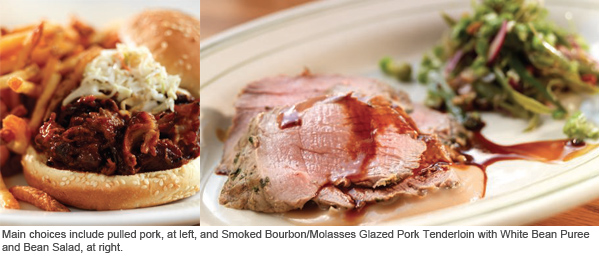The self-taught Jason Alley has been cooking since he was old enough to reach the stovetop at his boyhood home in rural Virginia. He’s a big boy now, and he’s stretching horizontally in Richmond, VA, where followers rave about the "local food cooked simply" at his Comfort and Pasture concepts. Pasture, which opened last year, has already branched out to a second location, in Charlottesville, VA. We recently caught up with this self-deprecating chef.
RH: Your style has been described as local food, simply prepared. How do you define that?
Alley: We do try to do what we can locally, but year-round there is only so much we can do. We do serve a lot of local meats and vegetables. Right now we’re using pumpkin, squash and kale. We also do a lot of pickling. Whatever vegetables we get, if we don’t use them immediately, we put up.
We also do all of our butchery in house. We make sausages and cure our own bacon, and if you get a burger here it will be local ground beef done up like a Big Mac, but all house made.
It’s simple—to an extent. We do all the work ahead of time to put out a fairly straightforward plate.
RH: Pickling is so on-trend right now. What have you pickled lately?
Alley: We have onions, shallots, beets, cauliflower, bread and butter pickles, spicy dill pickles, carrots, green beans…a lot of stuff. We use them in recipes, and we also do pickle plates.
RH: It seems like small plates are at odds with Southern cooking. How do the two mesh at Pasture?
Alley: A lot of what we are doing there is Southern, in that the ingredients are Southern and the cooks are Southern. So we serve steak tartare, with meat from a farm in West Virginia, and instead of cornichons we serve it with our dilly beans. We have local oysters and clams. We’ll make a fried rice with house-made ham.
We also do about five entrees. Some people just don’t like to share.
RH: How does the menu there compare with Comfort, your original concept?
Alley: Comfort is much more traditionally Southern. It’s set up as a “meat and three,” and the menu is on a chalkboard that changes pretty regularly. We always have meatloaf and catfish and other entrees. There are about 13 sides—you pick the protein and two or three sides. It’s much more traditional in its approach, but we using local ingredients and make everything in house.
RH: Do you cook some of your family recipes?
Alley: Sure, although the recipes have been a little tweaked. I am trying to give Southern food the respect that I feel it deserves. So you will see some classical techniques in our kitchens. We make cornbread every night, and instead of bacon fat we use olive oil and butter. I cook the same meat and vegetables that I ate growing up. But the mushroom gravy doesn’t come out of a packet. We make demi-glace for our gravy.
Alley on cooking school, "organic" labels
RH: You’re self-trained, but has anyone influenced you?
Alley: I’m self-trained as much as anybody can be. My influences include all the current hot Southern chefs: Hugh Acheson, Frank Stitt, Dale Hawkins. They are doing it in a much more visible way than I am.
RH: What happens when you hire people who have gone to culinary school? Is there a culture clash?
Alley: No. I’m not anti culinary school. But I think one of the things that’s difficult for kids coming out of school is that they will wash dishes and peel potatoes and make nothing doing it. The ones who put up with that succeed.
RH: You have been dismissive of the push for organics. Why?
Alley: I think it’s great inasmuch as if someone is concerned about those practices, they are typically concerned about the quality of the product and the health of the people consuming it. I like to know the grower, where the food is coming from and what they’re putting into it. It doesn’t make sense for a farmer to spend a whole year working on a crop and not spray because they want to be certified organic. I think sustainable growing practices are more important.
RH: Besides your personality, what do you consider the main draw at your restaurants?
Alley: What I try to do in both restaurants is create an environment where people can get delicious food and a great beverage program in a supercasual environment. I don’t want anyone to feel like they have to put a jacket on. I think people respond to that.
RH: You’ve been cooking all your life and worked in restaurants for more than two decades. Have you developed any pet peeves over the years?
Alley: I think a lot of the dining public thinks they’re more savvy and in touch with the restaurant business because of its high visibility on TV. People talk about being in the weeds and use other restaurant lingo. They act like they know a little more than they actually do.
The money sucks, the hours suck: It’s the same old story. But I don’t know how to do anything else, and I love it. You can make a living at it, but I find that people who really excel in the restaurant world are those who are really driven to do it.
I can’t imagine doing anything else.




